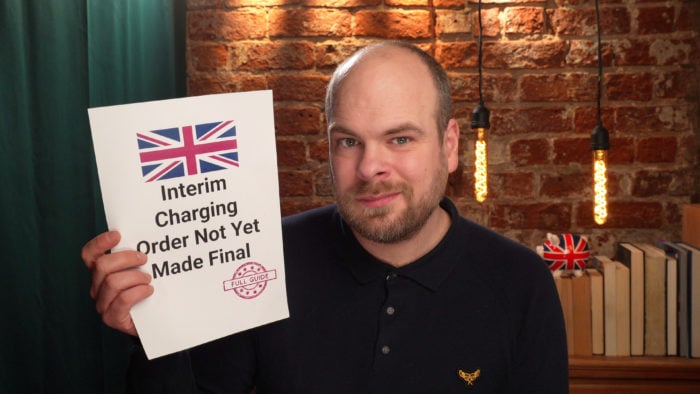Interim Charging Order Not Yet Made Final – There’s Hope!
For free & impartial money advice you can visit MoneyHelper. We work with The Debt Advice Service who provide information about your options. This isn’t a full fact-find, some debt solutions may not be suitable in all circumstances, ongoing fees might apply & your credit rating may be affected.

For free & impartial money advice you can visit MoneyHelper. We work with The Debt Advice Service who provide information about your options. This isn’t a full fact-find, some debt solutions may not be suitable in all circumstances, ongoing fees might apply & your credit rating may be affected.
Are you worried about an interim charging order? You’re in the right place for answers. Over 170,000 people, just like you, come to our website each month for advice on debt solutions.
In this article, we’ll guide you through:
- Understanding why a creditor applies for a charging order.
- Knowing what an interim charging order is.
- Learning about a final charging order.
- Finding out how you can appeal against a charging order.
- Discovering your options if your challenge isn’t successful.
We know that dealing with these matters can be scary, as some of our team members have had to handle charging orders themselves. But don’t worry, we have lots of advice to help you. We understand it’s not easy, but there’s hope. Let’s dive in to find out how to stop an interim charging order from becoming final.
At What Stage Can You Appeal?
Once an interim charging order has been put in place, you can object within the next 28 days.
The court will likely schedule a hearing. At this hearing, you can present facts and evidence why you’re challenging a final charging order. You need to send this information to the court at least 7 days before the date the hearing is scheduled to occur.
» TAKE ACTION NOW: Fill out the short debt form
How to Stop a Final Charge Notice
At the hearing, you can present all of the reasons why you believe that a final charging order would be inappropriate in your case. The court will then make a decision on whether to issue a financial charging order or not. Reasons you might give can include:
- There isn’t enough equity in the property to cover the debt.
- You are otherwise debt free, and no other creditors are chasing you for a debt.
- You are on top of the repayments to the creditor and are meeting your obligations.
- If you are issued a final charging order, then you will not be able to pay other creditors.
- A final order would place unreasonable stress or trauma on another person living on the property (e.g. children going to school).
How a debt solution could help
Some debt solutions can:
- Stop nasty calls from creditors
- Freeze interest and charges
- Reduce your monthly payments
A few debt solutions can even result in writing off some of your debt.
Here’s an example:
Situation
| Monthly income | £2,504 |
| Monthly expenses | £2,345 |
| Total debt | £32,049 |
Monthly debt repayments
| Before | £587 |
| After | £158 |
£429 reduction in monthly payments
If you want to learn what debt solutions are available to you, click the button below to get started.
What if Your Challenge Is Unsuccessful?
If the hearing results in your evidence being overturned and the final charging order is issued, there is still some hope. There are a few things you might try, as outlined below.
- You can apply for the final charging order to be set aside (cancelled).
- You can ask for the schedule and conditions of the final charging order to be changed.
- You can try to have the facts of the final charging order changed.
However, by this stage, the likelihood of having any changes to the final charging order made, or it being set aside, is quite low.
There would need to be some serious extenuating circumstances for the court to consider your request to stop a final charge notice.
Thousands have already tackled their debt
Every day our partners, The Debt Advice Service, help people find out whether they can lower their repayments and finally tackle or write off some of their debt.

Natasha
I’d recommend this firm to anyone struggling with debt – my mind has been put to rest, all is getting sorted.
Reviews shown are for The Debt Advice Service.
Why Does a Creditor Apply to the Court?
If you are taken to court by a creditor such as Cabot Financial, they may have successfully gotten a County Court Judgement (CCJ) against you.
The CCJ is an order for you to either make regular repayments to clear your debt, or it will have set a date that you have to repay the entire debt back.
But this doesn’t actually ensure that you pay back the debt. So there is a further action the creditor can take, in order to ensure that they have a route to follow to collect the debt.
And this comes in the form of initially an interim charging order, and then a final charging order.
This process gives the creditor a way to collect the debt by, in a worst-case scenario, forcing you to sell your home and pay them the debt in full.
As you can imagine, by the time you are facing a final charging order, you are about as far into trouble with debt as you can get without being declared bankrupt.
Remember, you can always avoid these drastic legal debt recovery actions by maintaining open lines of communication with your creditors.
If you think you’re going to miss a payment, contact your creditor immediately so they can see how to help you repay the debt in more affordable instalments.


